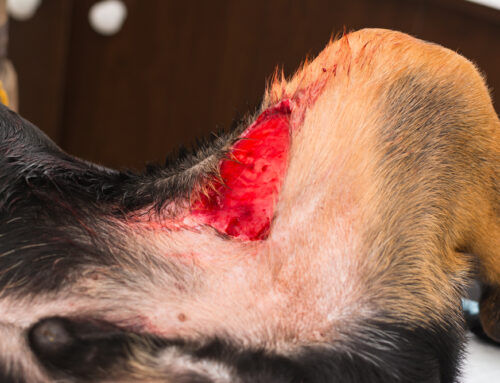As rural areas become urbanized, wildlife are forced out of their habitat, leaving, unfortunately, too little space for bear, coyote, and wild cat populations to find a new home. That forces the wildlife to share territory with family pets. Wildlife and cats and dogs are not a good mix, especially for pets, but with proper precautions, you can keep your furry friend safe. Some of the most common wild animals we see in Idaho include:
- Coyotes — Coyotes usually hunt small mammals such as mice, vole, or rabbits, but they may also consider similarly sized small dogs and cats their prey. On the other hand, they may see larger dogs as potential competitors, since coyotes are territorial. This canine cousin can also carry the risk of rabies, distemper, hepatitis, parvovirus, mange, ticks, fleas, and intestinal worms.
- Wild cats — Cougars mostly roam the Idaho countryside, but do make forays into civilization when pressed. You’re most likely to encounter these wild cats when hiking in the backcountry, where small dogs can become easy prey if left unprotected.
- Bears — In our area, we mostly see black bears, but grizzly bears also have been known to make their home in Idaho. Regardless, any bear species should not be ignored, as these large predators can break into homes in search of tasty snacks. Avoid leaving any food outdoors that can lure bears close to your home, and ultimately, to your pet.
- Snakes — The western and prairie rattlesnakes are the only venomous snakes in Idaho, but any snake bite can cause serious injury. Rattlesnakes are most commonly found in rocky areas, hiding under rocks, surface debris, or bushes, to avoid the heat of the day. They can also swim, so can be found around water. When hiking with your pet, avoid areas where snakes may be hiding during the hottest part of the day.
- Raccoons — Raccoons may look adorable, but they will attack pets and people if they feel cornered. And, in addition to rabies, they can also carry distemper, leptospirosis, and intestinal worms. Avoid leaving food out at night, and lock your trash cans up tight, to prevent raccoons from making your yard their home.
With so many wildlife species that may harm your pet, taking proper precautions is essential for keeping your four-legged friend safe. Here are five ways to help protect your pet from local wildlife.
#1: Don’t let your pet go outside at night alone
Most predators hunt at dawn and dusk, but can be active all night, so always go outside with your pet at night rather than letting them out in the backyard alone. Position motion-activated lights around your home to light up your yard and help ward off predators.
#2: Don’t leave pet food or water dishes outside
When you’re outdoors enjoying a sunny day with your pet, you may bring their food and water dishes outside. However, leftover food can attract unwelcome visitors to your yard when you head in for the night. Raccoons, skunks, and bears can sniff out a bowl of dog food, and may still be lingering in your yard when you let your pet out for one last bathroom break before bed.
#3: Keep your dog on a leash while hiking
Walks through local parks and nature preserves are a great way to exercise with your pet, but keep them on a leash for safety. Long leashes give your furry pal freedom, and allow you to supervise them. If your pet gets too close to a wild animal’s possible resting spot, such as thick brush, a cave, underground burrow, or pile of shady rocks, you can still guide them away with the leash.
#4: Remove brush and debris from your yard
Although your yard may be fenced, wild animals can use overhanging tree branches or other natural jumping blocks to pop over your fence. Keep trees trimmed back to help prevent raccoons and wild cats from dropping in uninvited, and ensure you have no holes under or in your fence. To make your yard less welcoming to wildlife, remove brush and debris that could become a cozy habitat for snakes, skunks, or raccoons.
#5: Keep your pet current on vaccinations

Vaccinations, such as rabies, distemper, parvovirus, and leptospirosis, are essential for protecting your pet from infectious diseases that wildlife can carry. Some of these diseases can also be passed from wildlife or your infected pet to you, so regular vaccinations are essential to protect your entire family. Wildlife also can carry external and internal parasites, including fleas, ticks, and intestinal worms, that can infect you and your pet.
Keep your pet fully armored against wildlife-transmitted infectious diseases and parasites by participating in routine preventive care, and ensuring they remain current on essential vaccinations. Contact Alpine Animal Hospital to schedule an appointment to update your pet’s vaccinations.







Leave A Comment